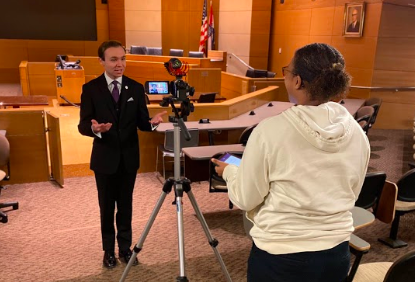On Jan. 29, UMKC law student Alex Higginbotham, the recently appointed chief justice of the Student Government Association (SGA) Supreme Court, spoke about the new judicial system’s role within the university.
Instituted by the SGA last year and with a majority of its justices appointed, the court, which had fallen out of use at UMKC years before, is expected to begin work sometime in the near future.
The SGA judicial system is closely modeled after the federal judicial system. Both judicial systems have similar structures in order to ensure there are checks and balances. This in turn ensures the three branches of government (executive, legislative and judicial) do not misuse their powers and hold one another accountable.
The UMKC judicial system chiefly interacts with the executive and legislative branches by giving advisory opinions. Advisory opinions indicate to the legislative and executive branches if any new laws that are under consideration violate SGA’s rules and constitution.
The role of each justice on the court is to hear and oversee the cases brought forth by students and student organizations. As the chief justice, Higginbotham oversees cases and represents the judicial system in weekly meetings with other branches. The chief justice and associate justices share equal voting power in case hearings.
Along with the other branches of SGA, the Student Supreme Court also benefits students and student groups. Students can bring laws they believe have broken the UMKC constitution to be reviewed by the court. According to Higginbotham, the court, “benefits the campus as a whole because any student organization that is registered through the Office of Involvement can file a case”.
A complaint must be emailed to umkcsupremecourt@mail.umkc.edu following the guidelines of a form that can be found on the SGA’s RooGroups page. Both parties of the case must submit evidence and witnesses to each other and the assistant dean of students to be considered for a hearing. Failure to comply with all steps could result in a dismissal of the case.
Currently, there is one justice seat vacant, and the SGA is deliberating on a possible candidate. To become a part of the SGA’s judicial system, one must be nominated by the SGA President and appointed by a majority Senate vote. More information can be found at RooGroups on SGA’s page under the documents tab.
hai3kd@mail.umkc.edu








